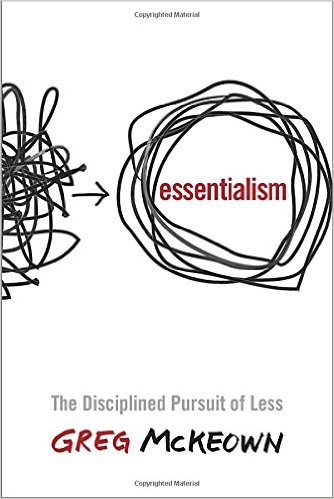Learn how cutting back on some things can help you succeed.
We live in a time where we have so many things to do. We often are overwhelmed by the options. This abundance, however, can have an unfortunate side effect, we can lose touch with the things which are really important to our happiness.
To remedy our ceaseless urge to amount stuff and fill out our schedules with tasks we can’t possibly complete. We should declutter and ask the question, what really contributes to my well-being? This is the essence of Essentialism.
The principles of Essentialism
- Do less, but do it better. Once you cut out the clutter, you have more time and energy to create a higher standard on stuff that matters most. Reject the notion that you should accomplish everything, and choose to excel in a specific direction.
- Question yourself if what you are doing is worthwhile or if you should invest your time and energy in something more important. Continually ask yourself, “Is this the very most important thing I should be doing with my time and resources right now?”
- “The way of the Essentialist means living by design, not by default.” Most people live their lives based upon what is happening to them. They react to situations good and bad, and then wonder why they can never get out in front of a situation for long enough to turn things around. Instead, the Essentialist sets his or her focus on what is most important at any given moment and then acts accordingly. Then, even if unexpected circumstances attempt to throw them off balance, they return quickly and easily to their “design.”
- Don’t expect to have it or do it all. Doing everything can prevent us from fully dedicating time to the things which are really important to us. Trade-offs are therefore crucial. Cut back on the things which don’t form part of your biggest goals.
- “Don’t be tricked by the trivial.” Many daily things — our cell phones for example — may seem trivial. Everyone uses them. But cell phones are a big productivity killer. Cell phones aren’t the only distractions. Our daily life is full of them, don’t get fooled into thinking they are normal and should be part of every moment.
- Learn to say No. “Say no to the nonessentials so we can say yes to the things that really matter.” Most of us sacrifice way too much time and energy to things we didn’t really want, just because we gave in to social pressure and said yes. Learn to be courageous enough to say no to the nonessentials.
Too much activity takes away our ability to chose for ourselves
People tend to fall into two traps which prevent them from making choices on their own. The first scenario occurs when people become overwhelmed by their obligations that they adopt a passive approach to life this attitude is learned helplessness.
The second category is those who become overly active, trying to accept every opportunity presented to them. At first this may seem good, but in reality, these people don’t have the power of choice about the opportunity which is best for them, they dilute their energy by trying to do everything.
If you want to create the life you want, you have to prioritize your plan, otherwise, you’ll likely fall into someone else’s plan.
Create “blank space” to think and focus on the bigger picture
Being idle isn’t a bad thing, it gives you time to think. Great minds like Einstein and Newton created a confined space for themselves to escape distractions and think about groundbreaking theories. Many of today’s successful CEOs do the same. Schedule a blank space every day dedicated to thinking about vital tasks. Thinking also serves another purpose, seeing things from a different perspective.
Getting clarity about the bigger picture
The daily hassle often causes people to get lost, not knowing where they are going and why. Blank spaces dedicated to reflection can help to concentrate on the big scheme.

